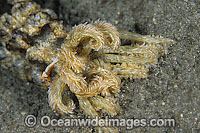Adapted for Survival
"This regeneration is, as far as we have been able to tell, scarless, and the resulting regenerated scales are indistinguishable from original ones."
"That is not the case of many other geckos, in which the regenerated scales have a distinctly different appearance to the original ones."
"It is reasonable to infer that this is a good escape strategy, or else it is unlikely to have evolved."
Mark Scherz, herpetologist, Bavarian State Collection in Zoology, Munich, Germany

Sea cucumbers are able to evade predators by swiftly exuding internal organs, so while the predator is busy eating and disentangling itself from the sticky, ribbon-like organs, the sea cucumber escapes and lives to regenerate replacement organs. Lizards are capable of sacrificing their tails to escape situations where they are being viewed as another creature's next meal. And nature has equipped the lizard with the biological mechanism whereby another tail can be regrown.
As many as are the creatures whose existence scientists are aware of, they, and we by extension, are becoming increasingly aware that many more exist, yet to be discovered. One such creature is the fish-scale gecko, known scientifically as Geckolepis megalepis, discovered on Madagascar which is a source for many exotic creatures. What makes this little gecko different is that it is capable of shedding its unusually large scales when a predator bites into the gecko.
The predator gets a mouthful of indigestible hard scales and the gecko gets another opportunity to escape a threat to its survival. The scales, the largest of any gecko yet known, represent the little creature's protective armour. Think porcupine, and quills that can be shot out like piercing arrows at a threat to the porcupine's survival. Think a deeply offensive, penetrating odour that burns the eyes and you have the very effective protective mechanism that skunks have been designed with.
The gecko, once its 'fish-scales' have been lost in defense of its existence, has the capability of regrowing them, and swiftly. It takes no more than a number of weeks for the rapid regeneration to take place. According to Dr. Scherz, the lead author on a paper describing the newly-discovered creatures, the deeper layers of the gecko's skin is comprised of cells called myofibroblasts which contract on contact.

The creatures' home seems to be as distinctive as the little lizard it harbours. Ankarana National Park in Madagascar is a geology comprised of razor-sharp limestone karsts where little vegetation can take root and thrive. The area has surrendered to scientific enquiry a number of bizarre new species, among them Day-Glo-coloured geckos of the genus Phelsuma, as well as 'ghost' snakes.



0 Comments:
Post a Comment
<< Home